#plastic recycling washing machines
Explore tagged Tumblr posts
Text
Findout Good Quality Rigid Plastic Shredder Machine For Sale
Unlock efficient plastic recycling with our top-of-the-line Plastic Shredder Machines at Machinemg.com. Designed to shred plastic waste into smaller pieces, our machines enhance recycling processes by preparing materials for further processing. Explore our range of Plastic Shredder Machines to improve waste management efficiency and contribute to a sustainable future.
#plastic crusher machine#wpc production line#plastic recycling washing machines#plastic shredder machine#pet bottle washing line#plastic film recycling machine#wpc extrusion line
0 notes
Text
The Economic Benefits of Plastic Recycling in India

Plastic recycling in India offers sizeable monetary blessings, bolstering both the surroundings and the economy. The country, grappling with extensive plastic waste, unearths recycling a feasible strategy to manipulate this issue even as growing financial opportunities.
Job Creation and Economic Growth
One of the maximum direct monetary advantages of plastic recycling India is task advent. The recycling enterprise employs heaps, from waste pickers to skilled workers in recycling flowers. This zone supports livelihoods, especially in city and semi-city regions, supplying solid incomes and improving residing standards.
Resource Efficiency and Cost Savings
Plastic recycling reduces the need for virgin substances, main to sizable value savings. Industries advantage from lower uncooked cloth charges, which in flip lowers manufacturing charges. This useful resource performance allows producers hold competitive pricing, promoting economic balance and growth.
Reducing Environmental Costs
By recycling plastic, India can appreciably cut down on the environmental fees associated with plastic waste. Managing pollution and waste disposal are luxurious for governments and communities. Effective recycling mitigates those fees, releasing up sources for different developmental initiatives. This discount in environmental charges interprets into economic financial savings, reaping rewards the broader economic system.
Boosting Exports and Economic Opportunities
The recycled plastic marketplace affords profitable export opportunities. Indian businesses can faucet into the global call for for recycled substances, contributing to the kingdom's GDP. Exporting recycled plastic not simplest brings in forex but additionally establishes India as a key participant in the international recycling industry.
Plastic recycling India is greater than an environmental necessity; it is a catalyst for economic prosperity. By capitalizing on recycling, India can foster an economic boom, decorate sustainability, and position itself as a frontrunner within the worldwide recycling area.
#plastic recycling machine#plastic recycling india#plastic recycling#waste plastic washing plant#plastic waste recycling machine#plastic scrap crusher
0 notes
Text
Plastik Geri Dönüşüm Makinaları
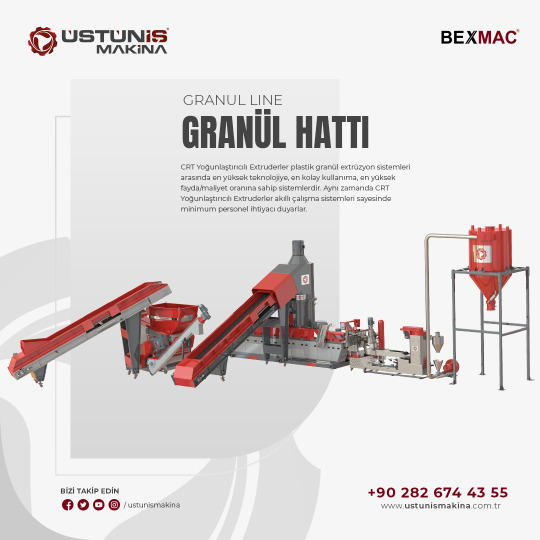
CRT Yoğunlaştırıcılı Extruderler plastik granül extrüzyon sistemleri arasında en yüksek teknolojiye, en kolay kullanıma, en yüksek fayda/maliyet oranına sahip sistemlerdir. Aynı zamanda CRT Yoğunlaştırıcılı Extruderler akıllı çalışma sistemleri sayesinde minimum personel ihtiyacı duyarlar.
https://www.ustunismakina.com.tr/plastik-geri-donusum-makinalari
#recycle#plastic#plastic recycling machine#plastik geri dönüşüm#plastic recycling#machine#extruder#üstün iş makina#washing line#shredder#crusher#crt#recycling#granule#grinder#screen changer#machining#manufacturing#metal manufacturing#plastik geri dönüşüm makinaları
0 notes
Text

@hylianengineer sorry I had to make a new post, the answer got too long for replies :D
Ah, the dreaded "but wool is itchy!". Not something I can relate to (I really like it when yarn/fabric has a bit of grip and structure to it, I'm not one for the ultra-soft, fluffy wools) but let's see if I can say smth useful.
First, you're definitely not alone in finding wool scratchy! A lot of people have sensory issues regarding it. Whether it can be helped at all will depend on how sensitive you are; some people can't even handle unspun 17 mic chubut merino and at that point, wool just isn't for them. Which is fine, not everything is for everyone.
Rule of thumb: the higher quality your fibre, the softer the finished garment will be. If it's just listed as "wool", it might contain recycled fibre, wool from sheep breeds that don't have a super fine fleece, or even wool from dead animals, all of which lowers the quality.
Virgin wool (I think) refers to wool that is spun for the first time, so a yarn that has no recycled fibres in it. Lambswool is a sheep's first wool. It is finer and smoother than adult wool.
Another big impact is breed of sheep and origin of the fibre. Merinos are the go-to for high quality items, but are also kept all over the world, so look to where your wool comes from. Aotearoa and South America are well known for their high quality merino wools. Sheep that live in colder, harsher climates produce a sturdy, tougher fleece, especially if they're not merino breeds. Depending on where you are, regional wool might not be what you're looking for. Britain is famous for their wool, but Shetland wool won't be super soft. Try some BFL (Bluefaced Leicester) if you can get it; it is smoother than merino and not as springy.
Wool can be superwash treated by coating the individual fibres, so the scales on the hairs are covered. This means it won't felt and can be machine washed; it also makes it less scratchy. This process is very energy- and water-intensive. The fibres are coated in silicone, I think, which makes the finished yarn feel kinda plastic-y, and it also lowers the insulating and water-repelling qualities of the wool. (All in all, you might as well buy acrylic)
You can also try looking for sheep's wool mixed with other animal fibres. Cashmere, alpaca, and mohair are probably the most common and all have their own qualities (cashmere is shiny and drapey; alpaca is smooth and kind of dense; mohair is light, extremely fluffy and super warm). All are softer than sheep's wool and nicer to the skin.
Anyway, all that to say: Look for virgin wool, look at the breed you're getting if it's specified, look for mixes with softer fibres, look at the origin of the wool. Unfortunately, when you're sensitive, navigating the world of natural fibres can be a bit of a minefield, I know. If wool isn't for you, that's not a moral failing!
#and yeah of course the price is an issue#obviously you dont want to spend so much money on a garment when you dont even know if youll be able to wear it#i promise you i get it#its just that personally for me wool is the best fibre in existence#but ik that my experiences are not universal#if you have a local independent yarn store with a good selection of indie brands go there and touch some fibres#when youre out shopping look at the labels#for online shopping....honestly dont#you will not know for sure how a garment feels until you touch it#texiles
91 notes
·
View notes
Text
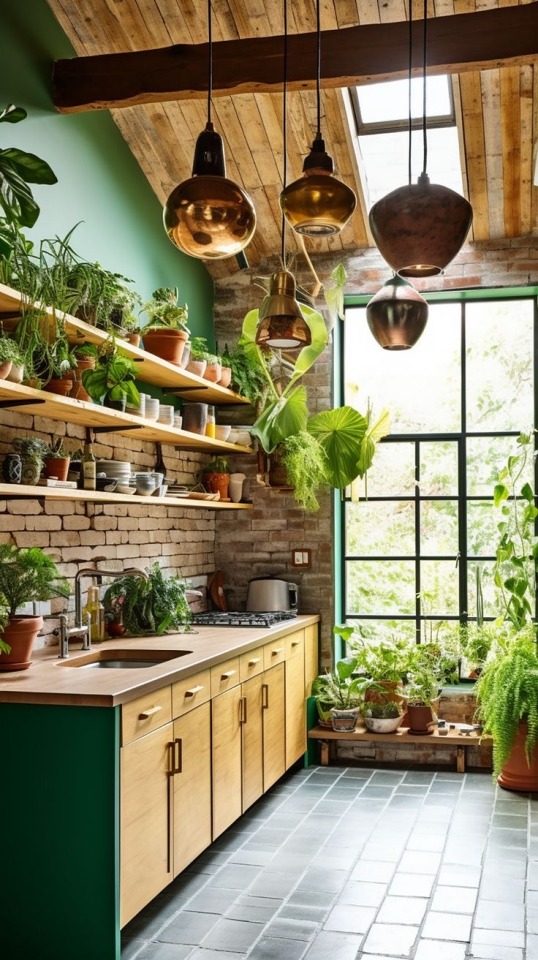

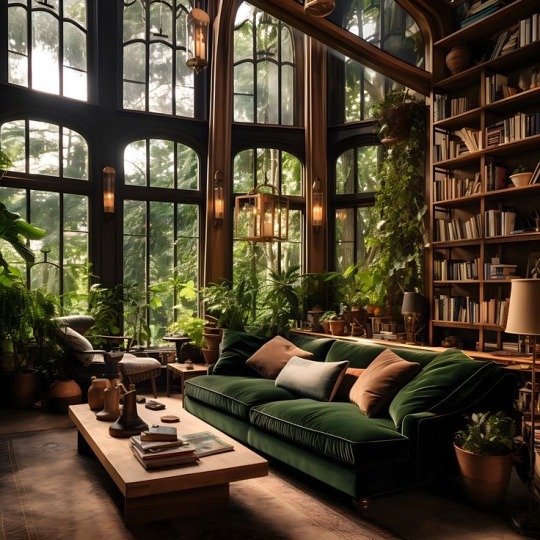

Ways to practice eco-friendly living in your home
1. Reduce energy consumption:
- Install energy-efficient appliances and LED light bulbs.
- Turn off lights and unplug electronics when not in use.
- Use natural light as much as possible.
- Set your thermostat to a lower temperature in winter and higher in summer.
- Insulate your home properly to reduce heating and cooling needs.
2. Save water:
- Fix any leaks in faucets and toilets promptly.
- Install low-flow showerheads and faucets.
- Collect rainwater for watering plants.
- Only run the dishwasher and washing machine with full loads.
- Use a broom instead of a hose to clean outdoor spaces.
3. Practice waste reduction:
- Recycle paper, plastic, glass, and metal.
- Compost kitchen scraps and yard waste.
- Opt for reusable products instead of disposable ones (e.g., cloth napkins, rechargeable batteries).
- Avoid single-use plastics, such as plastic bags and water bottles.
- Use a reusable shopping bag.
4. Use eco-friendly cleaning products:
- Choose natural, non-toxic cleaning products or make your own using ingredients like vinegar, baking soda, and lemon juice.
- Avoid products containing harmful chemicals that can harm the environment and your health.
5. Grow your own food:
- Plant a garden to grow vegetables, fruits, and herbs.
- Use organic and natural fertilizers instead of synthetic ones.
- Compost food scraps to enrich the soil.
6. Opt for sustainable materials:
- Choose furniture made from sustainable materials like bamboo or reclaimed wood.
- Use eco-friendly flooring options like bamboo, cork, or reclaimed hardwood.
- Select paint and other finishes that have low or no volatile organic compounds (VOCs).
7. Reduce plastic waste in the kitchen:
- Use glass or stainless-steel containers for food storage instead of plastic.
- Replace plastic wrap with beeswax wraps or reusable silicone covers.
- Use refillable water bottles and avoid buying bottled water.
8. Conserve energy in the kitchen:
- Use energy-efficient appliances.
- Cook with lids on pots and pans to retain heat and reduce cooking time.
- Opt for smaller appliances like toaster ovens instead of full-sized ovens when possible.
9. Encourage sustainable transportation:
- Use public transportation, walk, or bike whenever possible.
- Carpool or arrange a car-sharing service with neighbors or colleagues.
- Transition to an electric or hybrid vehicle if feasible.
10. Educate and involve your family:
- Teach your family about the importance of eco-friendly practices and involve them in the decision-making process.
- Encourage everyone to adopt sustainable habits and lead by example.
- Discuss environmental issues and brainstorm new ideas for greener living.
#home improvement#work from home#make money from home#homebrew#ecology#ecofriendly#sustainability#home design#home#acne treatment#homedesign#homemade#home decor#home business#home & lifestyle#homestuck#welcome home#homens de sunga#homeinterior#homestyle#cozyplaces#cozy glow#cozyhome#cozy cozy#cozy living#cozyvibes#cozy autumn#cozy fall#cozy mystery#cozycore
88 notes
·
View notes
Text
sometimes i wonder if i’m really mentally ill. my food doesn’t go bad, and my dishes don’t sit around longer than three days before i get to them. i change my sheets on the first of every month and do my laundry once a week. i put it in the wardrobe after at least a day. i go to the store to buy groceries every week, then i make food and eat it and separate my waste — plastics, paper, compostable organics and non-compostable “other”. i separate recycling and glass bottles. i wipe my surfaces and vacuum my room, i make my bed every morning, i air out my room and i water my plants and watch them grow, smiling at each new leaf winning the battle against all circumstances that want to keep life on the down-low around me.
sometimes i wonder if i’m really mentally ill when i see people unable to get out of bed let alone make it, when i see piles of dishes and laundry around them, when i see media portrayals of illness as nothing short of a disability. sometimes i wonder if that’s why i don’t get help. when i get grades no lower than a B, when i go to work and seem to all of society like a functioning member, like another cog in the machine flying under the radar.
sometimes i wonder if maybe i should stop doing the dishes. sometimes i wonder if i should stop washing my clothes, if i should stop getting any grades at all, if i should stop going to work and not get out of bed. sometimes i wonder if that’s what it takes for anyone to see. to see that there’s no joy to be found within these walls. no point, no reason, no purpose. no ambition, no hopes, no dreams.
sometimes i wonder what it means to be mentally ill, because obviously i am not. i’m too self-aware, too functional, not doing badly enough. the air constructing in my lungs is not bad enough, the tremor in my hands thinking about tomorrow is not bad enough, the hopelessness residing in the centre of my being is not bad enough, the pointlessness of everything not strong enough, the thoughts of dying not secret enough.
because i do my dishes. i eat my food before it goes bad. i have fresh clothes each day. i go to uni, i go to work, i water my plants and watch them grow.
i am not mentally ill. you will not find me on the screen. you will only read about me in an obituary.
— thoughts of a crazy person
104 notes
·
View notes
Text

A young cashier told an older woman that she should bring her grocery bags because plastic bags weren't good for the environment. The woman apologized, "We didn't have this green thing back in my day."
The young clerk said, "Your generation did not care enough to save our environment for future generations." She gave him a firm stare and a hard grin and said “Back then, we returned milk bottles, soda bottles, and beer bottles. The store sent them back to the plant to be washed sterilized and refilled, so it could use the same bottles over. They were recycled.
Grocery stores bagged our groceries in brown paper bags, which we reused for numerous things. We walked upstairs because we didn't have an escalator in every store and office building. We walked to the grocery and didn't climb into a 300-horsepower machine every time we had to go two blocks.
Back then, we washed the baby's diapers because we didn't have the throwaway kind. We dried clothes on a line, not in an energy-gobbling machine burning up 220 volts -- wind and solar power did dry our clothes back in our day. Kids got hand-me-down clothes from their brothers or sisters, not always brand-new clothing.
Back then, we had one TV, or radio, in the house -- not a TV in every room. The TV had a small screen the size of a handkerchief, not a screen the size of the state of Montana. In the kitchen, we blended and stirred by hand because we didn't have electric machines to do everything for us. When we packaged a fragile item to send in the mail, we used wadded-up old newspapers to cushion it, not Styrofoam or plastic bubble wrap.
Back then, we didn't fire up an engine and burn gasoline just to cut the lawn. We used a push mower that ran on human power. We exercised by working so we didn't need to go to a health club to run on treadmills that operate on electricity.
We drank from a fountain when we were thirsty instead of using a cup or a plastic bottle every time we had a drink of water. We refilled writing pens with ink instead of buying a new pen, and we replaced the razor blades with a razor instead of throwing away the whole razor just because the blade got dull.
Back then, people took a bus and kids rode their bikes instead of turning their moms into a 24-hour taxi service. We had one electrical outlet in a room, not an entire bank of sockets to power a dozen appliances. And we didn't need a computerized gadget to receive a signal beamed from satellites 23,000 miles in space to find the nearest burger joint. But the current generation laments how wasteful we old folks were just because we didn't have the green thing.”
The cashier stood there still and quiet as the old lady found her wallet to pay. Then lady turned to leave but stepped back and turned toward the cashier. She said “You have a world of knowledge in that little device in your hand. Pity you just use it to gossip, take pictures, and waste time. It would do you good to search a bit of history before you embarrass yourself like this again.
Forward this to another selfish old person who needs a lesson in conservation from a smart-ass young person.
12 notes
·
View notes
Text
Back in the day!
Anyone age approx 35 or over should read this - copied from a friend ... Checking out at the supermarket recently, the young cashier suggested I should bring my own bags because plastic bags weren't good for the environment. I apologised and explained, "We didn't have this green thing back in my earlier days". the cashier responded, "That's our problem today. Your generation did not care enough to save our environment for future generations".
She was right about one thing--our generation didn't have the green thing in “Our” day. So what did we have back then? After some reflection and soul-searching on "Our" day here's what I remembered we did have.... Back then, we returned milk bottles, pop bottles and beer bottles to the store. The store sent them back to the plant to be washed and sterilized and refilled, so it could use the same bottles repeatedly. So they really were recycled. But we didn't have the green thing back in our day.
We walked up stairs, because we didn't have an escalator in every store and office building. We walked to the grocery store and didn't climb into a 300-horsepower machine every time we had to go two blocks. But she was right. We didn't have the green thing in our day.
Back then, we washed the baby's nappies because we didn't have the throw-away kind. We dried clothes on a line, not in an energy gobbling machine burning up 240 volts -- wind and solar power really did dry our clothes back in our early days. Kids got hand-me-down clothes from their brothers or sisters, not always brand-new clothing. But that young lady is right. We didn't have the green thing back in our day.
Back then, we had one TV, or radio, in the house -- not a TV in every room. And the TV had a small screen the size of a handkerchief (remember them?), not a screen the size of the state of Wales. In the kitchen, we blended & stirred by hand because we didn't have electric machines to do everything for us. When we packaged a fragile item to send in the mail, we used wadded up old newspapers to cushion it, not Styrofoam or plastic bubble wrap. Back then, we didn't fire up an engine and burn petrol just to cut the lawn. We used a push mower that ran on human power. We exercised by working so we didn't need to go to a health club to run on treadmills that operate on electricity. But she's right. We didn't have the green thing back then.
We drank from a fountain when we were thirsty instead of using a cup or a plastic bottle every time we had a drink of water. We refilled writing pens with ink instead of buying a new pen, and we replaced the razor blades in a razor instead of throwing away the whole razor just because the blade got dull. But we didn't have the green thing back then.
Back then, people took the bus, and kids rode their bikes to school or walked instead of turning their mums into a 24-hour taxi service. We had one electrical outlet in a room, not an entire bank of sockets to power a dozen appliances. And we didn't need a computerized gadget to receive a signal beamed from satellites 2,000 miles out in space in order to find the nearest pizza joint. But isn't it sad the current generation laments how wasteful we older folks were just because we didn't have the green thing back then?
Please post this on your blog so another selfish old person who needs a lesson in conservation from a smarty-pants young person can read this!
44 notes
·
View notes
Text
tldr: WASH YOUR RECYCLABLES AND IF YOU DON’T KNOW IF IT CAN BE RECYCLED, DON’T PUT IT IN RECYCLING
hey guys! just gonna quick talk about something that i don’t think is discussed enough regarding recycling!
so you know when you finish a pizza and the box says “recycle me!”? well a lot of people are never told that recycling plants cannot recycle dirty cardboard. cardboard cannot be properly cleaned so when it is stained with food grease, the recycling plant will simply send it to the dump! typically, though, food stained cardboard CAN be put in ORGANICS!!!
now you may be thinking “why does it matter who sends it to the dump?”
WRONG!!! recycling plants (where i live, and in many other places) actually have a government mandated QUOTA of what percent of the things that they receive actually get recycled. for example, where i’m from the quota is around 14%. this means that if less than 14% of things sent to recycling plants actually end up being recycled, the government will CUT THEIR FUNDING.
this means that every non-recyclable that we throw in our recycling bins is bringing us further from the quota. if their funding gets cut we either:
1: wont have recycling as an option anymore (bad for the environment)
or
2: will have higher taxes to compensate for the extra money that it takes to fund recycling plants (bad for the people)
so you may be wondering, “woobiz, what *can* i put in my recycling bin?”
the answer is a lot of things! just make sure they are clean (this means rinsing them with water, not necessarily soap, just a good rinse should be enough for most things, should be visibly clean).
- metal cans and foils (foils should be cleaned and bunched into a ball)
- plastics with the numbers 1, 2, and 5 (should show with the recycling symbol)
- clean cardboard and paper
- glass (bottles, containers, etc)
now let’s talk about what CAN’T be recycled!
- anything dirty
- certain plastics (thinner plastics like bags, if you’re not sure, look it up or trash it)
- closed bags (if you have, say, an opaque trash bag full of recyclables and tied closed, the plant will most likely trash it because cutting it open can be a safety hazard if they do not know what is inside)
recyclables should be separated (don’t put plastic inside of a cardboard box or cans inside of a glass container, etc) because the scanners at the recycling plants will have a much harder time identifying the recyclable. you can put them all in the same recycling bin, just make sure they’re empty and separate for the machines.
recycling is great for the environment but it can’t help us to its full potential without education on what can and can’t be recycled. if you’ve read this through, thank you and i hope you learned something about recycling! if you have anything to add, feel free!!!
11 notes
·
View notes
Text

06-07-23 Why Patagonia helped Samsung redesign the washing machine
Samsung is releasing a wash cycle and a new filter, which will dramatically shrink microfiber pollution.
Eight years ago, Patagonia started to study a little-known environmental problem: With every load of laundry, thousands (even millions) of microfibers, each less than 5 millimeters long, wash down the drain. Some are filtered out at water treatment plants, but others end up in the ocean, where fibers from synthetic fabric make up a surprisingly large amount of plastic pollution—35%, by one estimate. Fragments of your favorite sweatshirt might now be floating in the Arctic Ocean. In a collaboration that began two years ago, the company helped inspire Samsung to tackle the problem by rethinking its washing machines. Today, Samsung unveiled its solution: A new filter that can be added to existing washers and used along with a “Less Microfiber” cycle that Samsung also designed. The combination makes it possible to shrink microfiber pollution by as much as 98%.
[…] Patagonia’s team connected Samsung with Ocean Wise, a nonprofit that tests fiber shedding among its mission to protect and restore our oceans. Samsung shipped some of its machines to Ocean Wise’s lab in Vancouver, where researchers started to study how various parameters change the results. Cold water and less agitation helped—but both of those things can also make it harder to get clothing clean. “There are maybe two ways of increasing the performance of your washing machine,” says Moohyung Lee, executive vice president and head of R&D at Samsung, through an interpreter. “Number one is to use heated water. That will obviously increase your energy consumption, which is a problem. The second way to increase the performance of your washing machine is to basically create stronger friction between your clothes . . . and this friction and abrasion of the fibers is what results in the output of microplastics.” Samsung had already developed a technology called “EcoBubble” to improve the performance of cold-water cycles to help save energy, and it tweaked the technology to specifically tackle microfiber pollution. “It helps the detergent dissolve more easily in water so that it foams better, which means that you don’t need to heat up your water as much, and you don’t need as much mechanical friction, but you still have a high level of performance,” Lee says. The new “Less Microfiber” cycle, which anyone with a Samsung washer can download as an update for their machine, can reduce microfiber pollution by as much as 54%. To tackle the remainder, the company designed a filter that can be added to existing washers at the drain pipe, with pores tiny enough to capture fibers. They had to balance two conflicting needs: They wanted to make it as simple as possible to use, so consumers didn’t have to continually empty the filter, but it was also critical that the filter wouldn’t get clogged, potentially making water back up and the machine stop working. The final design compresses the microfibers, so it only has to be emptied once a month, and sends an alert via an app when it needs to be changed. Eventually, in theory, the fibers that are collected could potentially be recycled into new material rather than put in the trash. (Fittingly, the filter itself is also made from recycled plastic.) When OceanWise tested the cycle and filter together, they confirmed that it nearly eliminated microfiber pollution. Now, Samsung’s challenge is to get consumers to use it. The filter, which is designed to be easily installed on existing machines, is launching now in Korea and will launch in the U.S. and Europe later this year. The cost will vary by market, but will be around $150 in the U.S. The cycle, which began to roll out last year, can be automatically installed on WiFi-connected machines.
#microplastics#textiles#laundry#environmental#science#patagonia#samsung#i'm. so excited.#also i HAD been silently judging patagonia a little for their heavy use of synthetics but. they ARE walking the walk actually.#(will say that ime the feel of natural fibers is just. better.)#(like. wool has an astonishing ability to keep you warm-but-not-sweaty at a bizarrely wide range of temps)#(whereas like. the synthetic fleece tops i still have are like. immediately cozy‚ sure‚ but you WILL get sweaty if you get warm)#(like being in‚ you know‚ a plastic bag!)#(so like. even if they Fix the Microplastics Problem i have no regrets abt switching my allegiance to woolens)#(but. still fucking THRILLED they might fix the microplastics problem.)#does make you feel like. i'm unavoidably a humanities person but. what are humanities ppl doing that matters this much.#like fundamentally if you really want to do good in the world you probably SHOULD become a scientist of some kind.#that said‚ science would almost certainly not be improved by my participating in it‚ so like. what can you do.#really hugely awed by & appreciative of scientists tho.#anyway. obvs this is really just a press release and we gotta see how this plays out but.#!
58 notes
·
View notes
Text
Pet Bottle Scrap Plastic Washing and Recycling Plant in Vijayawada

R Mech Machines LLP is a leading provider of advanced Pet Bottle Scrap Plastic Washing and Recycling Plants in Vijayawada. Our Manufacturing Unit is located in Ahmedabad, Gujarat, India. R Mech Machines LLP PET washing and recycling plants utilize advanced technology to ensure high efficiency in processing plastic waste. The process involves cleaning, sorting, and transforming PET bottles into high-quality, reusable plastic flakes. The recycled plastic flakes produced through our washing and recycling process are of the highest quality, suitable for reuse in the manufacturing of new bottles, packaging, textiles, and other products. R Mech Machines LLP provide tailored solutions based on your capacity, requirements, and budget, ensuring maximum efficiency and profitability. We design our plants to be energy-efficient and cost-effective, helping businesses reduce operational costs while improving production efficiency and output. Why R Mech Machines LLP is Your Ideal Partner in Vijayawada: Proven Expertise: R Mech Machines LLP is committed to providing the best solutions for your PET recycling needs. Our engineers and technical team bring vast expertise to each project. Comprehensive Support: We offer full support from plant design, installation, training, to after-sales service, ensuring smooth operations and long-term success for your business. Affordable Solutions: We price our Pet Bottle Scrap Plastic Washing and Recycling Plants competitively, offering high returns on investment while reducing operational costs. Application: Packaging Industry Textile Industry Construction Consumer Goods R Mech Machines LLP Offers Pet Bottle Scrap Plastic Washing and Recycling Plant in Vijayawada, Andhra Pradesh and including locations Visakhapatnam, Vijayawada, Guntur, Nellore, Kurnool, Kakinada, Rajamahendravaram, Kadapa, Mangalagiri-Tadepalli, Tirupati, Anantapuram, Ongole, Vizianagaram, Eluru, Proddatur, Nandyal, Adoni, Madanapalle, Machilipatnam, Tenali, Chittoor, Hindupur, Srikakulam, Bhimavaram, Tadepalligudem, Guntakal, Dharmavaram, Gudivada, Narasaraopet, Kadiri, Tadipatri, Chilakaluripet. Contact us today for more information or to request a quote. View Product: Click Here Read the full article
#Ahmedabad#AndhraPradesh#Exporter#ExporterofPETBottleScrapPlasticWashingandRecyclingPlant#Gujarat#India#Manufacturer#ManufacturerofPetBottleScrapPlasticWashingandRecyclingPlant#PetBottleScrapPlasticWashing#PetBottleScrapPlasticWashingandRecyclingPlant#PetBottleScrapPlasticWashingandRecyclingPlantExporter#PetBottleScrapPlasticWashingandRecyclingPlantin#PetBottleScrapPlasticWashingandRecyclingPlantinAhmedabad#PetBottleScrapPlasticWashingandRecyclingPlantinGujarat#PetBottleScrapPlasticWashingandRecyclingPlantinIndia#PetBottleScrapPlasticWashingandRecyclingPlantinVijayawada#PetBottleScrapPlasticWashingandRecyclingPlantManufacturer#PetBottleScrapPlasticWashingandRecyclingPlantSupplier#RMechMachinesLLP#RecyclingPlantinVijayawada#Supplier#SupplierofPetBottleScrapPlasticWashingandRecyclingPlant#Vijayawada
2 notes
·
View notes
Text
Plastic Squeezer Machine For Wet PE PP Films
Optimize your plastic recycling process with our cutting-edge Plastic Squeezer Machines at Machinemg.com. Our machines are designed to efficiently squeeze and dehydrate plastic waste, reducing volume and preparing it for further processing. Explore our range of Plastic Squeezer Machines to streamline your recycling operations and maximize resource utilization.
0 notes
Text
Plastic Granulator Machine India
Elevate plastic recycling efficiency with HIKON INDIA's premier Plastic Granulator Machine in India. Our advanced technology transforms plastic waste into valuable resources, reducing environmental impact. Engineered for precision and reliability, our granulator machines deliver exceptional performance. Join us in revolutionizing plastic recycling in India with HIKON INDIA's innovative solutions.
#plastic recycling machine#plastic waste recycling machine#plastic scrap crusher#waste plastic washing plant#plastic recycling india
0 notes
Text
Everything You Need to Know About Hotel Supplies
The hospitality industry thrives on its guests' comfort, satisfaction, and experiences. One often overlooked yet essential component is hotel supplies. These are the unsung heroes who transform ordinary stays into unforgettable experiences.
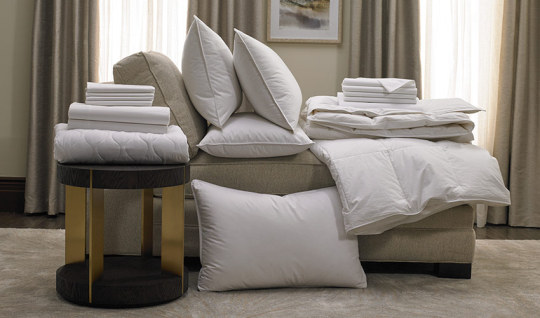
Why Hotel Supplies Are Crucial for Hospitality Success
Importance of Guest Experience
Think about it: when you stay at a hotel, what makes the experience memorable? Are they soft, luxurious sheets or eco-friendly toiletries? Hotel supplies are pivotal in ensuring guests feel pampered and valued.
Building a Competitive Edge in the Hospitality Industry
In an era of fierce competition, providing top-quality amenities can set you apart. Guests now compare even the smallest details, making your supplies a key differentiator.
Essential Categories of Hotel Supplies
Bedding and Linens
Nothing beats the feeling of sinking into a soft, clean bed after a long day. Premium-quality sheets, comforters, and pillows are must-haves.

Furniture and Fixtures
Sturdy, elegant furniture like desks, wardrobes, and lighting fixtures enhance comfort and functionality.
Bathroom Supplies
Toiletries and Towels
Could you stock up on shampoo, conditioner, body wash, and fluffy towels? High-end products leave a lasting impression.
Shower and Bath Accessories
From non-slip mats to rainfall showerheads, these small touches elevate luxury.

Lobby and Reception Supplies
Signage and Stationery
Ensure clear, professional signage and quality stationery for seamless guest communication.
Waiting Area Comfort Items
Think plush seating, magazines, and water dispensers to make guests feel at home.
Advanced Hotel Supplies for Modern Guests
Smart Room Technology
Guests expect convenience, and smart technology—like keyless entry and voice-controlled devices—delivers just that.
High-End Coffee and Snack Stations
Gourmet coffee machines and locally sourced snacks can create a memorable, personalized experience.
Sustainable Hotel Supplies
Eco-Friendly Toiletries
Swap single-use plastics for biodegradable options to impress eco-conscious travelers.
Recyclable Packaging and Biodegradable Products
From soap wrappers to laundry bags, sustainability can shine through thoughtful choices.
Energy-Efficient Appliances and Lighting
Save on costs and reduce your carbon footprint with energy-efficient solutions.
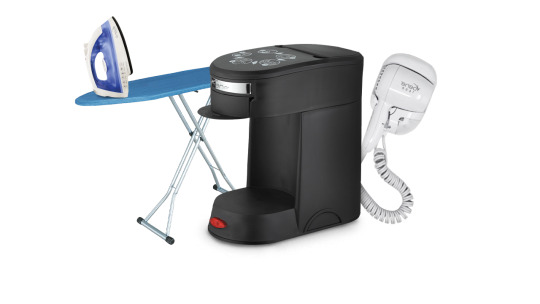
Choosing the Right Hotel Supply Vendors
Factors to Consider When Choosing Vendors
Look for reliability, quality, and competitive pricing. Ensure your vendor aligns with your sustainability goals.
How to Build Long-Term Relationships with Suppliers
A strong partnership can lead to better deals and consistent supply. Communicate your needs and expectations clearly.
Trends in the Hotel Supplies Industry
Personalization in Amenities
From monogrammed towels to custom-scented toiletries, personalization is in high demand.
Increased Focus on Sustainability
Hotels invest more in green practices, and your supplies should reflect this trend.
Technology-Driven Innovations
Automation in housekeeping and inventory management is revolutionizing the way hotels operate.
Budgeting for Hotel Supplies
Cost-Effective Buying Tips
Buy in bulk, negotiate discounts, and compare suppliers to get the best deals.
Balancing Quality and Affordability
Invest in items that provide long-term value, even if they cost more upfront.

FAQs About Hotel Supplies
What are the must-have hotel supplies? Essentials include quality bedding, toiletries, and energy-efficient appliances.
How can hotels ensure sustainability with their supplies? Opt for eco-friendly products and reusable materials to minimize waste.
How do I choose the right vendor for hotel supplies? Research their reputation, compare prices, and ensure they offer consistent quality.
Are personalized amenities worth the investment? Yes! Personalized touches can create a memorable experience and foster guest loyalty.
What role do hotel supplies play in guest satisfaction? High-quality supplies significantly enhance the guest experience, leading to better reviews and repeat business.
2 notes
·
View notes
Text

science is cool
my parents are scientists
it's a funny job to have grown up around
My Father, in particular, works for a research intensive university, which means that he ends up in all sorts of trades, learning random pieces of information.
In effect, aside from the teaching side, he is a prostitute who the university pimps out to larger, older clients, for luxury, longer term contracts. He can say no, of course, but rarely has reason to.
"Let's see, little-pharma, you're looking for a lanky chemical-physicist who cannot leave the house without 3 layers of band shirt and a corduroy jacket, is that right?"
"Does he have any...um...special interests?"
"Well as a matter of fact, he's a rehologist, do you know what that is?"
*gasping and blushing*
It can be quite depressing though: after creating a surface coating that prevented barnacles attaching to ships (which cause thousands to be wasted on fuel as the ship becomes less and less streamlined over time) everything was scrapped because you had to apply two coats, which is commercially too costly to sell upfront.
Did you know that your washing machine actually runs about 10°c lower than whatever you set it at, because for years detergents have been effective enough to work at lower temperatures, but by force of habit people kept using the higher settings and wasting energy?
Something else is that in the UK, at least, most of the plastic we send to recycling is actually just burned, or sent abroad.
"not our problem anymore"
My mum works with DNA and other human molecules. The technology we have now means that we could basically do whatever we want to a person, we just don't- it's illegal.
The principle is that if you can do it to ape DNA, you can do it to a person, and we can do a hell of a lot to apes.
Probably the best thing she's done is put bacterial genes inside jellyfish to make them glow green.
Someone could have done that to you as a foetus, they just didn't.

Anyway, science is cool, and I'm still going to disappoint my parents by becoming an amoral, humanities-worshipping, child-of-diablo lawyer :D
#science#biology#chemistry#physics#stemblr#women in stem#scientists#nerdy stuff#geek#geeky stuff#ramblings#rambles#oddities#technology#innovation#anecdote#science is cool#science is fun
4 notes
·
View notes
Text
Vintage Floral Pillow


About product
Vintage Floral Embroidered Pillow perfect for adding a cozy and decorative touch to your living space. This pillow is ideal for those who appreciate vintage-inspired decor and want to create a warm and inviting atmosphere in their home. Great for holidays, celebrations, and special occasions. Product features - 100% Spun polyester for shape retention - Beige plastic zipper with metal head for a stylish look - Recycled polyester pillow insert for extra volume - Double sided print for versatility - Concealed zipper for a seamless look Care instructions - Remove the pillow cover. Pre-treat the stains with soft cloth or bristle brush that had been soaked in warm soapy water. Machine wash, max 40°C (104°F), normal cycle. Do not bleach, tumble dry on low, do not dry-clean. Iron, steam, or dry low heat only. Fluff to reshape when assembling it back together.
You can get this product HERE
#creativeart#gift#abstractart#floraldesigns#handmade#birthday gift#inspirecreativity#relaxation#pillow princess#pillowfort#throw pillow#decorative pillows#beds#accent pillows#throw pillows
2 notes
·
View notes